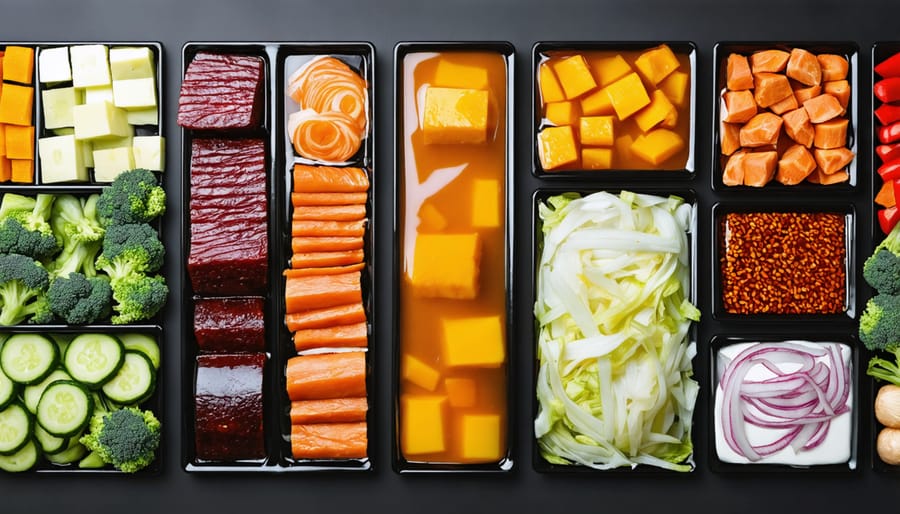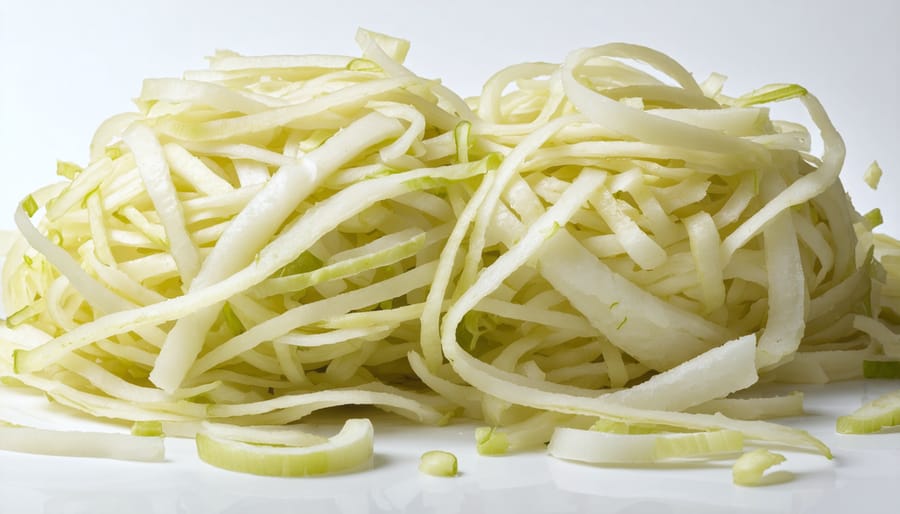
Fermented foods have emerged as powerful allies in our quest for optimal gut health, offering a natural and delicious way to support our digestive system. From tangy kombucha to probiotic-rich kimchi, these traditional foods are experiencing a modern renaissance as science continues to unveil their remarkable benefits. Taking a mindful approach to eating fermented foods can transform your digestive wellness, boost your immune system, and enhance your overall health.
Recent research has shown that the live beneficial bacteria in fermented foods help maintain a diverse and healthy gut microbiome – the complex ecosystem of microorganisms living in our digestive tract. These friendly bacteria not only aid in digestion but also produce essential nutrients, support mental health, and help protect against harmful pathogens.
Whether you’re dealing with digestive issues or simply looking to enhance your overall wellness, incorporating fermented foods into your daily diet could be the game-changing step you’ve been seeking. Let’s explore how these ancient superfoods can revolutionize your gut health and why they deserve a permanent place on your plate.
The Science Behind Fermented Foods
What Happens During Fermentation
Ever wonder what’s happening in those jars of fermenting vegetables on your counter? Let me break down this fascinating process! During fermentation, beneficial bacteria naturally present on foods (or added through starters) begin to feast on the sugars and carbohydrates present. This feeding frenzy creates an environment where good bacteria thrive while harmful bacteria can’t survive.
I remember being amazed when I first learned about these fermentation process tips and how simple yet magical the whole thing is. As these friendly bacteria multiply, they produce lactic acid, which not only preserves the food but also creates that distinctive tangy flavor we love in foods like kimchi and sauerkraut.
What’s really exciting is that during this process, these beneficial bacteria, or probiotics, become more concentrated. They also create beneficial compounds called postbiotics, which can include vitamins, enzymes, and other nutrients that weren’t present in the original food. It’s like watching nature’s own little chemistry lab at work, transforming ordinary vegetables into supercharged gut-health heroes!

The Gut-Friendly Benefits
When it comes to supporting your digestive health, fermented foods are like a friendly army of beneficial bacteria coming to your rescue. As someone who struggled with occasional bloating, I’ve experienced firsthand how incorporating these foods into my diet has made a noticeable difference. These probiotic powerhouses work in multiple ways to enhance your gut health.
First, they introduce beneficial bacteria that help maintain a balanced gut microbiome. Think of your gut as a bustling neighborhood – the more good bacteria you have, the better the community thrives. These friendly microorganisms help break down food more efficiently and improve nutrient absorption, making it easier for your body to get the most out of what you eat.
Fermented foods also produce beneficial compounds like short-chain fatty acids, which help reduce inflammation and strengthen your gut barrier. Plus, the fermentation process partially breaks down nutrients, making them easier to digest. This is particularly helpful if you sometimes find certain foods challenging to process.
What I love most about fermented foods is that they can actually help reduce common digestive issues like bloating and irregular digestion patterns. They’re nature’s way of supporting our gut health, and the benefits often extend beyond just digestion to impact our overall wellbeing.

Best Fermented Foods for Your Gut
Yogurt and Kefir
When I discovered the transformative power of yogurt and kefir, it completely changed my gut health journey. These probiotic powerhouses are packed with beneficial bacteria that can help restore balance to your digestive system. While both are fermented dairy products, kefir typically contains a wider variety of beneficial microorganisms than yogurt.
For the best gut health benefits, look for plain, unsweetened varieties with “live and active cultures” clearly stated on the label. I always recommend checking the ingredients list – the shorter, the better! Greek yogurt offers extra protein, while traditional kefir has a tangier, more complex flavor profile that some find takes getting used to.
If you’re dairy-sensitive, don’t worry! There are excellent plant-based alternatives made from coconut, almond, or oat milk that still deliver those precious probiotics. Just be sure they’re actually fermented and not simply flavored to taste like yogurt.
Start with a small serving daily and gradually increase as your body adjusts. Your gut will thank you!
Kimchi and Sauerkraut
Let me share a delightful discovery from my own kitchen experiments – kimchi and sauerkraut aren’t just tasty condiments, they’re powerhouses of gut-friendly bacteria! These traditional fermented vegetables have been brightening meals for centuries, and now science confirms what our ancestors knew instinctively.
Both kimchi, the spicy Korean staple, and sauerkraut, its tangy European cousin, are created through lacto-fermentation, where natural bacteria transform regular cabbage into probiotic-rich wonders. During this process, beneficial bacteria multiply, creating that distinctive zingy flavor while producing vitamins, particularly B vitamins and vitamin K.
What I love most about these fermented vegetables is their versatility. Try adding a spoonful of sauerkraut to your sandwich or serving kimchi alongside your morning eggs. The combination of probiotics, fiber, and enzymes in these foods helps support digestive health while adding an exciting punch of flavor to everyday meals.
Kombucha and Other Fermented Drinks
Let’s talk about my favorite gut-healthy beverages! Kombucha, that fizzy fermented tea that’s taken the wellness world by storm, is packed with beneficial probiotics and organic acids. I remember being skeptical about its unique taste at first, but now I can’t imagine my morning routine without it.
Beyond kombucha, there’s a whole world of fermented drinks to explore. Kefir, often called “drinkable yogurt,” offers more probiotic strains than regular yogurt and is perfect for smoothies. Apple cider vinegar drinks, while tangy, can support digestive health when diluted with water. And don’t overlook traditional options like kvass (a fermented beet drink) or rejuvelac (made from sprouted grains).
What I love most about these beverages is how easily they fit into daily life. Whether you’re sipping on water kefir as an afternoon pick-me-up or enjoying a kombucha mocktail at dinner, you’re giving your gut health a delicious boost.
My Personal Favorites
As someone who’s been on a gut health journey for years, I’ve discovered some fermented favorites that have become staples in my daily routine. My morning always starts with a small glass of kombucha – I love how it gives me a natural energy boost without the jitters of coffee. For lunch, I often add a generous dollop of homemade sauerkraut to my salads or sandwiches. The tangy crunch adds such a delightful dimension to any meal!
My absolute game-changer has been incorporating kimchi into my dinner recipes. I was initially hesitant about the spiciness, but now I can’t imagine my rice bowls without it. For snacks, I keep a jar of probiotic-rich pickles in my fridge, and I’ve recently started experimenting with kefir smoothies, which have become my post-workout treat.
What I love most is how these foods make me feel – energized, balanced, and surprisingly satisfied. Plus, my digestive system has never been happier!
Adding Fermented Foods to Your Daily Diet
Starting Small
Like dipping your toes in a pool before diving in, starting your fermented food journey should be gentle and gradual. I remember when I first began incorporating these foods into my diet – a spoonful of sauerkraut here, a few sips of kombucha there. Trust me, your gut will thank you for this careful approach!
Begin with just one tablespoon of fermented foods per day, preferably with a meal. This could be a dollop of plain yogurt with your breakfast or a small serving of kimchi with your lunch. After a week, if you’re feeling good, slowly increase the amount to two tablespoons, and continue this gradual progression.
Listen to your body during this process. Some people might experience mild bloating or changes in digestion initially – this is normal as your gut microbiome adjusts. If you notice any discomfort, simply scale back and progress more slowly.
Choose one type of fermented food to start with rather than introducing multiple varieties at once. This way, you can better monitor how your body responds. Many people find that starting with yogurt or kefir is easiest, as these familiar foods are generally well-tolerated.
Remember, consistency matters more than quantity. It’s better to have a small amount daily than large amounts sporadically. As you become more comfortable, you can explore different fermented foods and gradually build up to larger portions.
Easy Recipe Ideas
Ready to transform your meals with gut-friendly fermented foods? Here are some delicious and simple ways to incorporate these nutritional powerhouses into your daily diet!
Start your morning with a probiotic boost by adding a dollop of plain kefir to your smoothie bowl or overnight oats. For lunch, try adding kimchi to your sandwich or wrap – it adds a delightful crunch and tangy kick that’ll wake up your taste buds. I love mixing sauerkraut into my tuna salad for an extra zip of flavor and gut-healthy benefits.
Looking for a quick snack? Spread some miso paste on whole-grain crackers or use it to make a warming afternoon soup. For dinner, consider adding tempeh to your stir-fries or creating a colorful Buddha bowl topped with pickled vegetables. My personal favorite is marinating tempeh in tamari and herbs before grilling – it’s a crowd-pleaser every time!
Don’t forget about kombucha – it makes a refreshing alternative to sugary drinks and can be enjoyed throughout the day. For a probiotic-rich dessert, try plain yogurt topped with honey and fresh fruit. These simple additions can make a significant difference in your gut health journey while keeping your meals exciting and flavorful.

What to Watch Out For
While fermented foods offer numerous benefits, there are some important considerations to keep in mind. If you’re new to fermented foods, start slowly – introducing too much too quickly can lead to temporary digestive discomfort like bloating or gas. Think of it as your gut’s adjustment period to these beneficial new friends!
For those with histamine sensitivities, some fermented foods might trigger reactions. I learned this firsthand when a friend experienced headaches after consuming kombucha daily. It’s worth noting that not everyone needs the same amount or types of fermented foods – following a personalized nutrition approach can help you find what works best for your body.
Watch out for added sugars in store-bought fermented products. Some manufacturers add extra sweeteners to make their products more palatable, which can counteract some of the health benefits. Always check labels and opt for varieties with minimal added ingredients.
If you’re immunocompromised, consult your healthcare provider before adding fermented foods to your diet. While generally safe, the live bacteria in these foods might not be suitable for everyone.
Lastly, proper storage is crucial. Improper fermentation or storage can lead to harmful bacteria growth. Store your fermented foods according to package instructions, and trust your senses – if something smells or looks off, it’s better to err on the side of caution.
As we’ve explored throughout this article, fermented foods are more than just a trendy addition to your plate – they’re a powerful tool for supporting your gut health and overall well-being. From tangy kombucha to creamy yogurt and zesty kimchi, these probiotic-rich foods offer a delicious way to nurture your microbiome and enhance your digestive health.
I remember when I first started incorporating fermented foods into my diet. Like many of you might be feeling, I was a bit hesitant about the unusual flavors and textures. But starting small – maybe a spoonful of sauerkraut here, a serving of kefir there – helped me develop not just a tolerance, but a genuine love for these foods.
The science is clear: fermented foods can help improve digestion, boost immune function, and even support mental health through the gut-brain connection. But perhaps the best part is how accessible and versatile they are. Whether you’re buying them from the store or trying your hand at home fermentation, there’s an option for every lifestyle and taste preference.
Why not start your fermented food journey today? Begin with something familiar like yogurt or pickles, and gradually explore more adventurous options. Your gut will thank you, and you might just discover some new favorite foods along the way. Remember, small changes can lead to significant improvements in your health – and incorporating fermented foods is one change that’s both enjoyable and beneficial.



